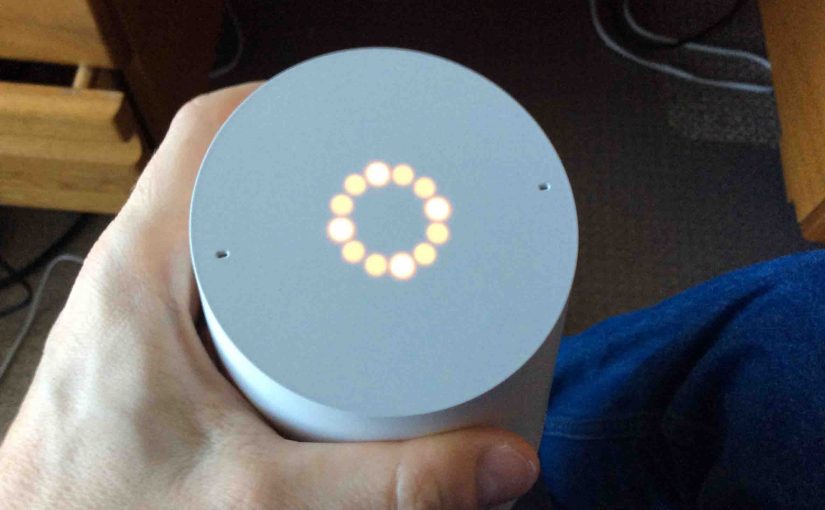You may experience Wi-Fi connection errors when booting your original Google Home speaker. Or, the smart speaker does not show as connected in the Google Home app. Both problems occur when the speaker is no longer linked to your Wi-Fi network. These situations can occur if you’ve changed your WiFi network name (SSID) or network password, but have not yet updated your Google Home device accordingly. This post details how to change the WiFi network on Google Home to account for new router additions or replacements For this demo, we use the 2018 versions of the Google Home app. They made easier the process somewhat in later versions of this app.
With your iOS or Android based tablet and the Google Home app, connecting your smart speaker to a different Wi-Fi network is especially simple, and is done as follows.
We assume here that the Google Home app has previously been linked to your Google account, that you’ve installed this app on a mobile device, and that your mobile device as well as the speaker are in range of the new Wi-Fi network; the one you wish to connect your speaker to.
The screenshots below were taken from an Apple iPad Air. However, a similar Google Home app for Android is also available from the Google Play store.
Now, to the procedure.
How to Change WiFi Network on Google Home
1. Connect your Smart Speaker to Power
If not already operating, plug your speaker into a power source, as you’ll need to access the network parameters stored in its memory, as described below. You won’t be able to change these settings without AC power. The next picture shows the Google Home speaker connected to AC power via the included AC adapter.
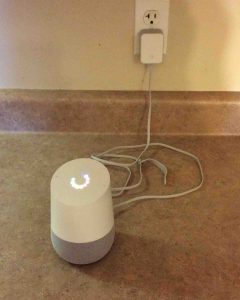
Wait until your speaker finishes booting before proceeding to the next step.
2. Move your Tablet Close to the Speaker
Avoid being further than fifteen to twenty feet away, for maximum setup speed and minimum errors.
3. Start Up the Google Home App
Run this app on your tablet computer. This app gives you access to your current Google devices and settings, and allows you to change them as needed.
The app is located somewhere on the home screen pages, depending on where you might have moved it. On our iPad Air, it’s on home page three, as shown next, as pointed at by the purple arrow.
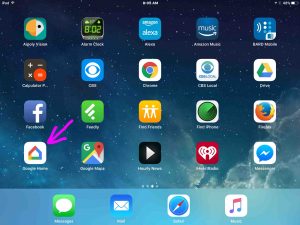
We got the following screen at Google Home App startup.
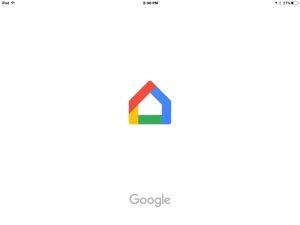
After a short period, you’re taken to the home screen. Ours displayed as follows
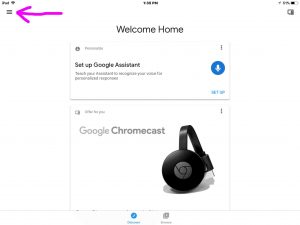
4. Tap the Hamburger Menu Control to Continue with How to Change WiFi Network on Google Home
This item (the three horizontal stacked lines) is located at top left corner of the Home screen, as displayed in the previous picture. The app’s main menu then displays as shown in the next picture
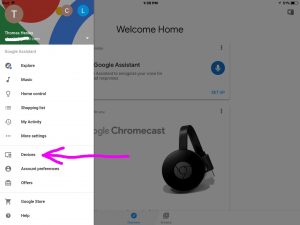
5. Tap the Devices Menu Item
In the main (hamburger) menu, find the Devices item, as pointed at by the purple arrow in the previous screenshot. You may have to swipe up in the menu area in order to scroll the Devices item into view.
Depending on whether or not your speaker is connected currently to a Wi-Fi network, different screens will appear at this point.
If your speaker is currently connected and functioning correctly to an access point in your home network, you’ll then see a screen similar to the screenshot in step 6. Go there for further instructions in this case.
If your speaker is powered up but not connected to any Wi-Fi network, then you’ll see a screen like the one pictured at the top of step 7. Go there for specific instructions that address this case.
6. Speaker is Online or Connected
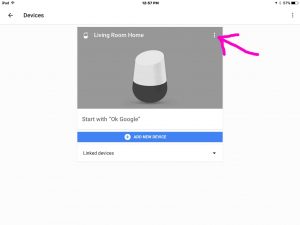
This shows that your speaker is online and can accept voice commands and questions. This would be the case if you have multiple Wi-Fi networks in your home, and you wish to disconnect your speaker from one of them that is working, and connect it to another of them. Maybe you moved the speaker from the first to the second floor, and would like to connect it to the second floor access point if you have one, because its Wi-Fi signal is stronger and more reliable up there. In short, you’re moving your speaker from one working Wi-Fi network to another.
6a. Tap the Device’s Hamburger Menu Item to Continue with How to Change WiFi Network on Google Home
Find the hamburger control item pointed to by the purple arrow in the last picture. You then see a pop-up menu appear in place of the hamburger button, as shown in the next picture.
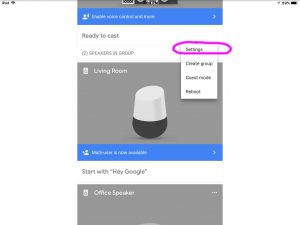
6b. Tap the Speaker Device’s Settings Menu Item
The Settings item is circled in the last picture. The original Google Home speaker’s Settings screen then appears, as shown next. Then, scroll down that screen until you locate the Wi-Fi setting, as circled in the next picture.
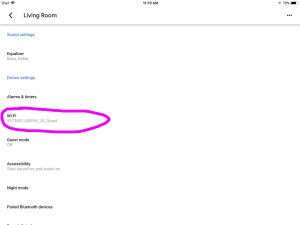
6c. Tap the Wi-Fi Setting on the Device Settings Screen
The WiFi item is shown in the above picture. This setting shows the Wi-Fi network to which the speaker is currently connected, as circled in the previous screenshot.
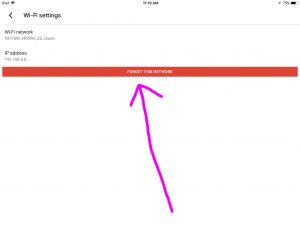
In this scenario, we wish to disconnect from the 937T681J4059H_2G_Guest network, and connect to the 937T681J4059H_5G network. Both are in range and available to our Google Home speaker.
6d. Tap the Forget This Network Bar to Continue with How to Change WiFi Network on Google Home
As shown in the last step, our speaker is currently connected to the 937T681J4059H_2G_Guest network. We want to forget that network, as mentioned. So we do so by tapping the red bar. The -Forget This Network Confirmation- screen then appears, as shown next.
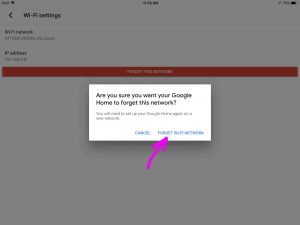
6e. Tap the Forget Wi-Fi Network Button
The Forget Wi-Fi Network option is pointed at by the purple arrow in the previous picture. The Google Home app then briefly displays the Forgetting Wi-Fi Network screen, as shown next.

Executing this step disconnects your speaker from its current Wi-Fi network while the above screen is displayed, as well as forces your speaker to forget the settings it retains in its memory for that network (SSID, security type, and password et al).
After a short pause, you are returned to the Home screen in the Google Home app, as shown next.

6f. Again, Tap the Hamburger Menu to Move Forward with How to Change WiFi Network on Google Home
Again, find the hamburger control on the Google Home App Home screen. The main menu then displays as shown in the next picture.

6g. Tap the Devices Menu Item
In the main (hamburger) menu, find the Devices item, as pointed at by the purple arrow in the previous screenshot. You’ll now get the same screenshot as covered next. Now, continue with step 7.
7. Speaker Offline or Disconnected from Wi-Fi
If your speaker is offline (i.e. not able to connect to any in-range Wi-Fi networks), or if you previously disconnected it from Wi-Fi as described in step 6, then you’ll see something like the next screen.
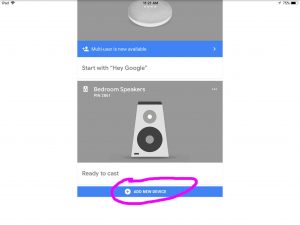
If your speaker does not appear in the Devices list, then proceed with step 7a. If it does, and is showing that it requires set up, then skip ahead to step 8.
7a. Press the Add New Device Button
If you and your mobile device that you’re running the Google Home app on are close to the speaker, and it still does not appear in the Devices list, then you may have Bluetooth on your mobile device turned off. If that’s the case, then the Google Home app asks you to turn Bluetooth on, as shown next.
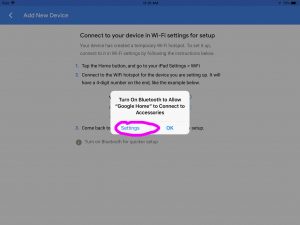
7b. Tap the Settings Button to Continue with How to Change WiFi Network on Google Home
This takes you to the Settings app on your mobile device, specifically, to the Bluetooth settings page. We got the following page on our iPad Air when we did this.
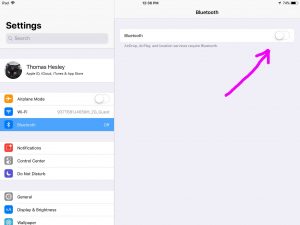
7c. Enable Bluetooth
In our case, we toggled on the switch pointed at by the purple arrow in the previous picture. Then, our Bluetooth Settings screen filled in as shown next.
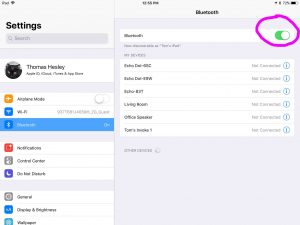
As circled in the previous picture, our Bluetooth is now turned on.
7d. Return to the Google Home App
The app then displays the Devices screen again. But this time, your original Google Home smart speaker should now appear in that list, with a needing setup status, as shown next.
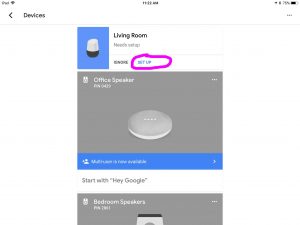
8. Press the SET UP Link on Devices Screen
The app then attempts to find and connect to the original Google Home speaker, and displays the following screen and message while doing so.
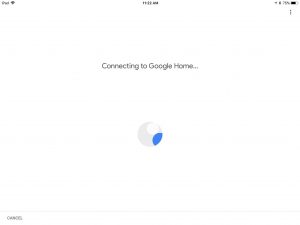
Reminder: Be sure your tablet is within several feet of the speaker. Otherwise, setup may fail.
If all goes well, the Google Home app will search for your speaker and find it. When it does, it plays a chord sound on the speaker and displays the following screen.
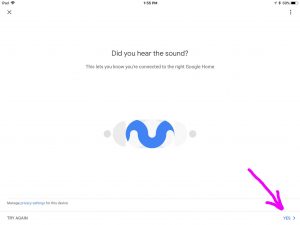
9. Tap the Yes Link to Continue with How to Change WiFi Network on Google Home
Tap the Yes link if your speaker did play the chord noise. The app then displays the Where is this device? screen, as shown next.
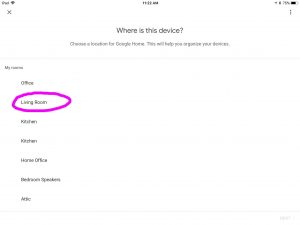
10. Tap a Room Name for your Google Speaker
Google provides a list of suggested names on the list as seen on the last screen. We picked Living Room for ours.
The screen then changes to the following, showing our room choice (Living Room) checked, as shown next.
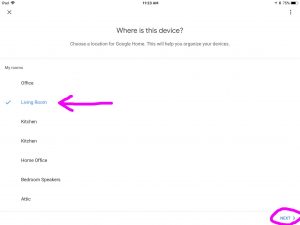
11. Tap the NEXT > Link
The Choose Your Wi-Fi Network prompt then appears as follows.
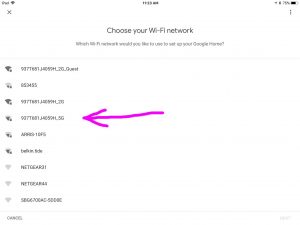
12. Tap the Wireless Network Name you Wish your Speaker to Connect With
on this screen. For ours, we’re selecting the 937T681J4059H_5G network. So we tap that, and it becomes checked, as shown in the next screenshot.
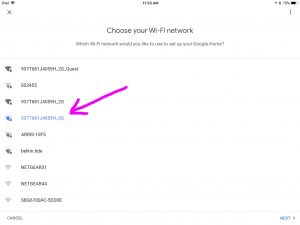
13. Tap the NEXT > Link to Continue with How to Change WiFi Network on Google Home
If you’ve never logged into this network before with its current password, the system will prompt you to enter a password for it, as shown next.
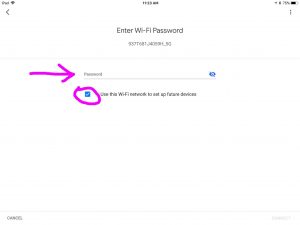
If you wish this same wireless network to be used if you add any other Google Home devices at this location in the future, then leave the Use this Wi-Fi network to set up future devices checkbox checked. If not, then uncheck this.
14. Enter Password of the New Wi-Fi Network
Tap the Enter your Wi-Fi password field, observe the virtual keyboard appear, and then type in the password. Your screen should look similarly to the next screen shot.
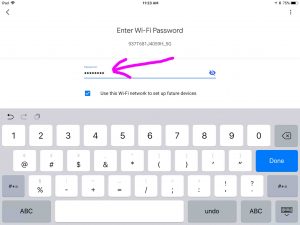
After you’ve punched in the correct password, collapse the virtual keyboard. You should then get the following screen.
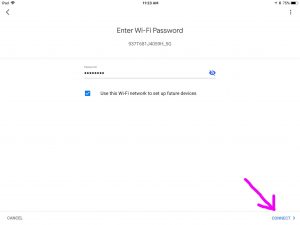
15. Tap the CONNECT > Link
Do this step once you’ve typed in the password.
Your speaker then attempts to connect to the Wi-Fi network of choice.
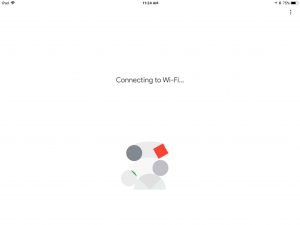
If it encounters no trouble, the Wi-Fi Connection Successful screen appears briefly, as shown next.
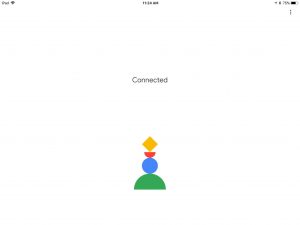
After several seconds, the app returns you to its home screen, as shown next.
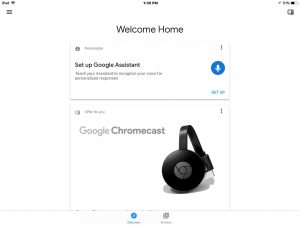
Your speaker is now connected to a different Wi-Fi network. Ask it the time, and you’ll know the connection is good if the speaker responds with the correct answer.
You’re done!
Related Posts to How to Change WiFi Network on Google Home
References for How to Change WiFi Network on Google Home
Revision History
-
- 2023-02-22: First published.
